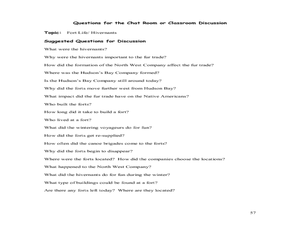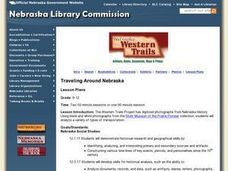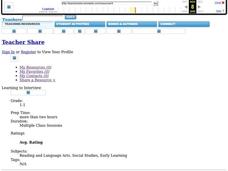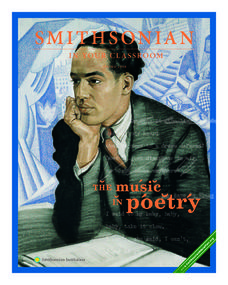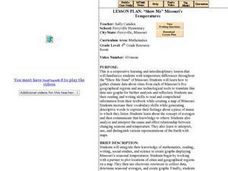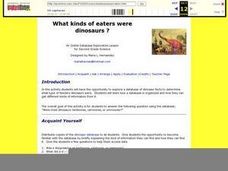Curated OER
Static Electricity
Students engage in a instructional activity that is concerned with the concept of static electricity. They conduct an experiment with balloons and make observations of how it works. The data is collected and written down and they define...
Curated OER
Hivernants: The Wintering Voyageurs
Students research the history of fur posts in North America. In this North American history activity, students apply skills of historical interpretation by collecting and analyzing data from historic sources on the fur trade expansion.
Curated OER
Traveling Around Nebraska
Learners analyze a current or historical photograph from their textbook and as a class complete a worksheet of the analysis. Using the Photographic Analysis Form, they locate and analyze two transportation photographs and use the...
Curated OER
Learning to Interview
An authentic and engaging way to practice literacy skills, this lesson calls for young language arts pupils to conduct interviews with classmates and family members. First, pupils watch as the teacher models the interview process with a...
Smithsonian Institution
Smithsonian In Your Classroom: The Music in Poetry
Take poetry off the page and put it into terms of movement, physical space and, finally, music with this series of three lessons from the Smithsonian Institution. This resource introduces students to two poetic forms that originated as...
Curated OER
All The Bell & Whistles
Young adults are so eager to get that first cell phone. And, cell phones have so many cool extras! Learners conduct real-life research to determine which cell phone carrier offers the best deals on things like wall paper, ringtones, and...
Newseum
Are You a Publisher?: Free Press and You
What kinds of media do your pupils use to read and publish information? After a discussion about what publishing means, and about the freedom of the press, class members interview one or two other people about their publishing habits....
School Improvement in Maryland
Political Systems: Advantages and Disadvantages
Every political system has advantages and disadvantages. To gain an understanding of these differences, groups investigate the political system of another country—oligarchy, monarchy, dictatorship, parliamentary—and prepare a...
NASA
3...2...1...Puff!
Which will make it fly better? Individuals build paper rockets with fins that are launched using straws. After determining an average flight distance, they make adjustments, such as size and location of fins, and try again. A second...
Radford University
Staircases and Ramps
Ramp up the study of slope. The class participates in a discussion about the physical aspects of stairs and ramps they encounter. Small groups work together and measure a staircase and corresponding ramp to calculate the slope of each....
Curated OER
"Show Me" Missouri's Temperatures
Fourth graders gather climate data about cities from each of Missouri's five geographical regions and use technological tools to translate this data into graphs for further analysis and reflection.
Curated OER
The Immigrant Experience
Young scholars utilize oral histories to discover, analyze, and interpret immigration and migration in the history of the United States. A goal of the unit is fostering a discussion and encouraging students to make meaning of the bigger...
Curated OER
Conservation of Momentum Experiment
Learners conduct an experiment dealing with momentum, energy and collisions in order to collect usable data sets. Data sets gathered are graphed and used to calculate conservation of momentum, amount of energy change, and classify the...
Curated OER
Plotting Coordinates on a Cartesian Plane
Young scholars practice identifying points on a coordinate plane, creating charts, and calculating ratios. In groups, students play a "battleship" game where they determine the location of their own fleet and attempt to find the...
Curated OER
Food Webs
Students research what food is eaten by the following organisms: penguins leopard seals, krill, elephant seals, petrels, albatross, fur seals, squid, insects and grass. They make a food web using the data they have gathered.
Curated OER
Air Pollution: Visible and Invisible
Fourth graders work together to complete an experiment on air pollution. They identify visible and invisible forms of pollution. They gather their data in notebooks and analyze their results to end the lesson.
Curated OER
Traditional Gardening in Alaska
Students research local history of agriculture using books, internet and local Elders. They conduct an interest survey for a community garden, using information gathered through interviews with Elders. A graphic organizer may be used to...
Curated OER
There Is A Lady In The Room
Young scholars use magnifiers to observe the characteristics of ladybugs. From recorded observations and gathered data, they construct patterns and graphs of their favorite ladybugs. Children listen to a book on The Grouchy Ladybug and...
Curated OER
They Don't Just Eat Grass
Students explore and examine different types of feed used for livestock. They discuss types of feed, the need for energy and health, and create graphs of food compared to categories. Students organize data and complete worksheets on...
Curated OER
Athletics Datafile
In this computer worksheet, students load and open a copy of ViewPoint and Olympics. They explore the data by identifying how many men and women are contained in the file and which country has the most files. Then they plot a bar graph...
Curated OER
Using Spreadsheets and Graphs
Third graders explore mathematics by utilizing computers. In this graphing lesson, 3rd graders gather class data based on a particular topic such as the "favorite candy" of the class. Students utilize this information and computers to...
Curated OER
California Missions
Fourth graders use what they already have gathered on California missions to create a database. Using the different missions, they brainstorm, organize and categorize what they have gathered. They present their material to the class and...
Curated OER
What Kind of Eaters Were Dinosaurs?
Second graders use a database to gather more information on dinosaurs. Using the information, they discover how the database is organized and how to get different information from it. They complete a worksheet with comprehension...
Curated OER
Dino-Facts!
Students use a database to gather facts about dinosaurs. They practice searching about specific dinosaurs that are of interest to them. To end the lesson plan, they write a story describing the behaviors, eating habits, and environments...
Other popular searches
- Science Data Gathering
- Gathering and Graphing Data
- Data Gathering Strategies
- Gathering Qualitative Data
- Data Gathering Tests
- Gathering and Charting Data
- Math Data Gathering
- Math, Data Gathering
- Gathering Weather Data
- Data Gathering and Analysis
- Errors in Data Gathering
- Data Gathering Accuracy

